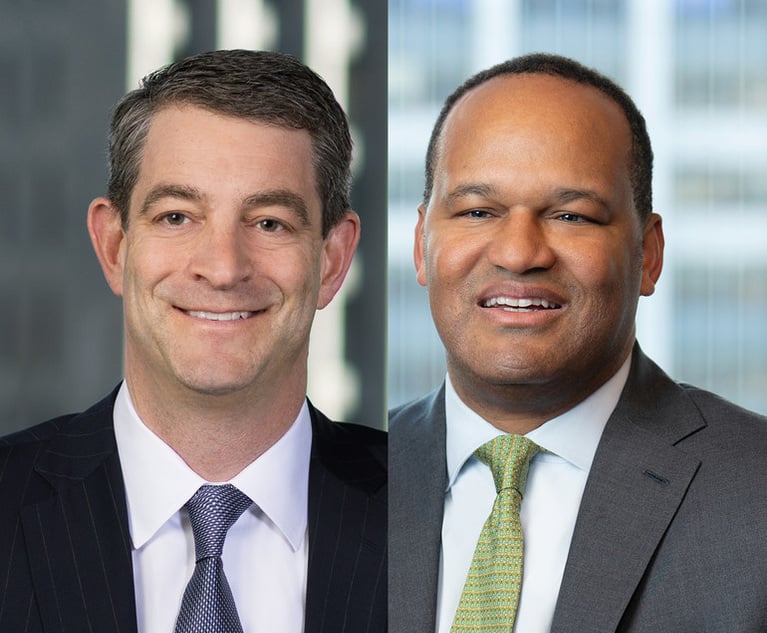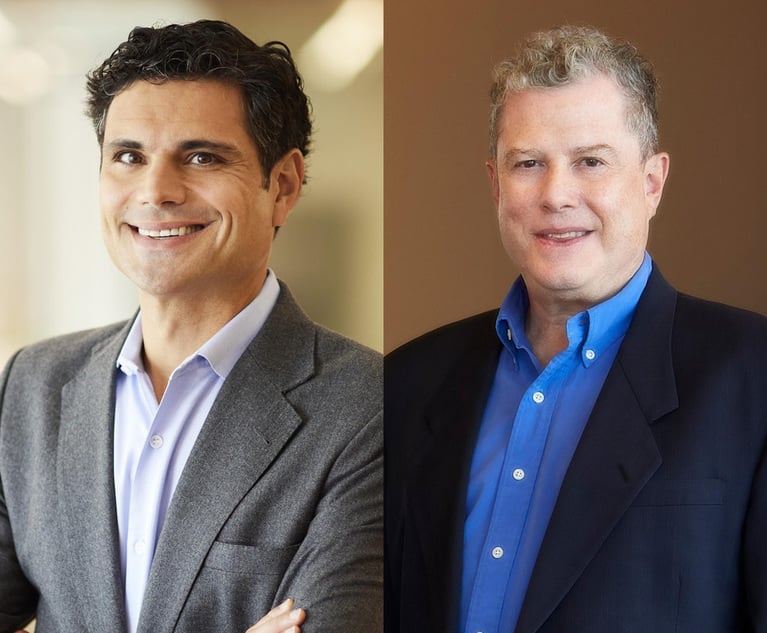Law Firms Need to Have Uncomfortable Conversations About Race
Liên H. Payne, a former Big Law attorney, says firms too often leave "the laborious work of dismantling discriminatory practices to the person most affected by the problem, most likely to lose employment for raising it, and with the least power to solve it."
July 02, 2020 at 05:00 AM
8 minute read
 Credit: nchlsft/Shutterstock.com
Credit: nchlsft/Shutterstock.com
Let me begin with a confession. I fear that when this article is published, my attempt at honesty will be dismissed as privileged whining. I fear I will be shunned by the legal community and that future employment prospects will be hampered. I fear that this article will have a negative impact on my career without creating any lasting change in how law firms treat Black attorneys. And yet, I continue to type.
 Liên Payne
Liên PayneThe inspiration spurring my fingers is Lauren Skerrett, a junior attorney at a top-tier firm. Skerrett's recently published article on Above the Law, "On Being A Black American Biglaw Associate," describes how the absence of formal work assignment systems leads to racialized distribution of billable hours among Big Law associates. Partners assign work to associates with whom they feel comfortable working. But majority white partnerships lead to more work for white associates because they are easier for white partners to relate to and engage with. Black associates are left in a bind: they are overlooked in favor of their white peers, but vocalizing frustrations results in partner discomfort and even less work. Eventually, the Black associate's low billable hours—the most important metric in evaluating performance—becomes proof that they are not a "good fit" for the firm. The associate is then quietly let go or departs when it becomes clear that promotion is unattainable.
As I read the article, my awe for Skerrett led to an online name search and a Law.com article about her brave publication. The article revealed that partners at Skerrett's firm thanked her for stepping forward, acknowledged they were aware of the difficulties facing Black associates, and admitted that no one (prior to her) was directly raising such issues. The partners then asked Skerrett what they could do to help. My budding excitement withered to disappointment.
You see, in Big Law there are constant whispers about discrimination. Firms hold annual diversity retreats to discuss how to hire and retain more diverse classes of associates and talk about the general need for change within the legal industry. But the change is never clearly defined. Each year, the retreats are repeated yet fail to result in said change. There is never a true reckoning, an inward look at both the people and systems (or lack thereof) that lead Black attorneys to leave Big Law more quickly than their peers. It is the same lack of reckoning and accountability that I see in the partners' response to Skerrett's article.
The partners left the laborious work of dismantling discriminatory practices to the person most affected by the problem, most likely to lose employment for raising it, and with the least power to solve it. With their response, the partners evaded the difficult task of looking inward to evaluate to whom they most frequently assign work and why. Starting yesterday, the partners could have solved persistent cultural fit issues by making the conscious decision to assign work to associates based on something other than a psychologically understandable—but not merit-based—preference.
However, law firms should not sidestep the responsibility of instituting formal policies to solve work distribution issues by leaving the task to partner introspection. Firms should hire work coordinators to act as assignment intermediaries. Work coordinators could track associate hours weekly, check in with partners about upcoming assignments, and distribute those assignments to associates based on hours needed. Handing over the responsibility of assigning work to official coordinators eliminates the distribution of billable hours based on interpersonal dynamics. Of course, if an associate is assigned to a matter, they should be able to remain on that matter without having each assignment vetted by a work coordinator. But more than once, I have seen favored associates overloaded with multiple full-time matters while other associates remain desperate for billable hours. Work coordinators would prevent this scenario. Many firms use work coordinators for summer associate classes; they can afford to continue using them for associates at all levels.
Separately, partners will need to tackle the undesired duty of giving routine feedback to associates, which is surprisingly uncommon in Big Law. Often, when an associate's work product is misaligned with partner expectations, the partner thanks the associate and gives future work to someone else. All associates in Big Law have been thoroughly vetted through long interview processes and summer clerkships. If partners provide associates feedback, these vetted employees will more often than not rise to the challenge. However, when partners disengage where feedback is necessary, they undercut corporate mission statements about the desire to increase retention of Black associates. Lack of feedback affects all associates, but with already small ranks of Black associates, general practices weed out the few.
Billable work distribution and training feedback is only part of the solution. The greater moral challenge is for partners to create real space for Black associates to speak up about their experiences without fear of retribution. I have both witnessed and experienced the dismissal of comments like Skerrett's, sometimes coupled with conduct suggesting the "complaining" attorney should remain quiet if they want to keep their position. In one light, the dismissals make sense. Complaints are generally disfavored by Big Law partners, as associates are paid well to work long hours without complaint. But if partners want to make room for conversations about discrimination, they will need to challenge the strict hierarchy that stifles associate speech. This is a difficult task—one appeal of being a partner is that you do not have to listen. Others listen to you. But unless partners risk the discomfort of standing up to those peers who refuse or dismiss conversations about racial inequities, the burden will continue to fall on the already marginalized.
In all of this, what law firms most overlook is that the Black attorneys in their ranks are, by definition, exceptional. The grit, determination and resilience required for a Black attorney to overcome historic barriers to success is extraordinary. Law firms, thus far, have failed to accept and confront the fact that predominantly white partnerships and associate preference lead to racialized work distribution. Conversations about diversity and inclusion most often put the onus on the Black associate, who is told to try harder to make connections with partners or offered monthly virtual lunch meetings with associates of color in other offices to foster community.
As a woman of dual Black and Asian ancestry, I recall with both amusement and irritation the time a well-meaning partner stated publicly that he was not at all against giving "a little extra help" to "diverse" associates. Black associates do need help—but only to level the playing field. Black attorneys in Big Law have already fought against the odds to get into the right schools, obtain the right internships, and secure the right jobs. The issue, of all things, is not a lack of initiative.
This article is not intended to lambaste any partner. I am in no position to judge the sincerity behind any partners' show of support for Skerrett. The partners' responses are only important because they exemplify the wider problem in Big Law that I have already discussed: partner silence coupled with an intolerance for both self-reflection and exiting their comfort zones to take meaningful action. Though hierarchy exists within firm partnerships, each partner has attained a level of monetary privilege sufficient to act as a golden parachute should retaliation result from holding their peers accountable. The powerful rainmaker umbrella should no longer act as cover for avoidance of difficult conversations about racial discrimination, whether intentional or unintentional.
As a final word, I am no longer among Big Law's ranks, but I am aware that Big Law attorneys are some of the most well-paid individuals in this country. This piece is no tiny violin, crying for the fortunate while so many in this country do without. I simply hope that the same law firms that now post statements of solidarity with Black Americans on their websites and social media platforms realize that their support of the Black Lives Matter movement should include inward reflection about what their fellow Black attorneys face within their own halls.
If conversations about race in Big Law continue to be comfortable for everyone in the room, the critical work is not being done.
Liên Payne is a former Big Law attorney who co-founded the minority and women-owned boutique litigation firm Kennedy Payne. She received her J.D. from Berkeley Law. Prior to attending law school, she earned an M.A. in broadcast journalism from the Missouri School of Journalism and a B.A. in government from Smith College.
This content has been archived. It is available through our partners, LexisNexis® and Bloomberg Law.
To view this content, please continue to their sites.
Not a Lexis Subscriber?
Subscribe Now
Not a Bloomberg Law Subscriber?
Subscribe Now
NOT FOR REPRINT
© 2025 ALM Global, LLC, All Rights Reserved. Request academic re-use from www.copyright.com. All other uses, submit a request to [email protected]. For more information visit Asset & Logo Licensing.
You Might Like
View All
'None of Us Like It': How Expedited Summer Associate Recruiting Affects Law Students and the Firms Hiring Them

Latham's Lateral Hiring Picks Up Steam, With Firm Adding Simpson Practice Head, Private Equity GC
3 minute read

Leaning Into ‘Core’ Strengths, Jenner’s Revenue Climbs 17%, Profits Soar 23%
4 minute readTrending Stories
- 1New York State Authorizes Stand-Alone Business Interruption Insurance Policies
- 2Buyer Beware: Continuity of Coverage in Legal Malpractice Insurance
- 3‘Listen, Listen, Listen’: Some Practice Tips From Judges in the Oakland Federal Courthouse
- 4BCLP Joins Saudi Legal Market with Plans to Open Two Offices
- 5White & Case Crosses $4M in PEP, $3B in Revenue in 'Breakthrough Year'
Who Got The Work
J. Brugh Lower of Gibbons has entered an appearance for industrial equipment supplier Devco Corporation in a pending trademark infringement lawsuit. The suit, accusing the defendant of selling knock-off Graco products, was filed Dec. 18 in New Jersey District Court by Rivkin Radler on behalf of Graco Inc. and Graco Minnesota. The case, assigned to U.S. District Judge Zahid N. Quraishi, is 3:24-cv-11294, Graco Inc. et al v. Devco Corporation.
Who Got The Work
Rebecca Maller-Stein and Kent A. Yalowitz of Arnold & Porter Kaye Scholer have entered their appearances for Hanaco Venture Capital and its executives, Lior Prosor and David Frankel, in a pending securities lawsuit. The action, filed on Dec. 24 in New York Southern District Court by Zell, Aron & Co. on behalf of Goldeneye Advisors, accuses the defendants of negligently and fraudulently managing the plaintiff's $1 million investment. The case, assigned to U.S. District Judge Vernon S. Broderick, is 1:24-cv-09918, Goldeneye Advisors, LLC v. Hanaco Venture Capital, Ltd. et al.
Who Got The Work
Attorneys from A&O Shearman has stepped in as defense counsel for Toronto-Dominion Bank and other defendants in a pending securities class action. The suit, filed Dec. 11 in New York Southern District Court by Bleichmar Fonti & Auld, accuses the defendants of concealing the bank's 'pervasive' deficiencies in regards to its compliance with the Bank Secrecy Act and the quality of its anti-money laundering controls. The case, assigned to U.S. District Judge Arun Subramanian, is 1:24-cv-09445, Gonzalez v. The Toronto-Dominion Bank et al.
Who Got The Work
Crown Castle International, a Pennsylvania company providing shared communications infrastructure, has turned to Luke D. Wolf of Gordon Rees Scully Mansukhani to fend off a pending breach-of-contract lawsuit. The court action, filed Nov. 25 in Michigan Eastern District Court by Hooper Hathaway PC on behalf of The Town Residences LLC, accuses Crown Castle of failing to transfer approximately $30,000 in utility payments from T-Mobile in breach of a roof-top lease and assignment agreement. The case, assigned to U.S. District Judge Susan K. Declercq, is 2:24-cv-13131, The Town Residences LLC v. T-Mobile US, Inc. et al.
Who Got The Work
Wilfred P. Coronato and Daniel M. Schwartz of McCarter & English have stepped in as defense counsel to Electrolux Home Products Inc. in a pending product liability lawsuit. The court action, filed Nov. 26 in New York Eastern District Court by Poulos Lopiccolo PC and Nagel Rice LLP on behalf of David Stern, alleges that the defendant's refrigerators’ drawers and shelving repeatedly break and fall apart within months after purchase. The case, assigned to U.S. District Judge Joan M. Azrack, is 2:24-cv-08204, Stern v. Electrolux Home Products, Inc.
Featured Firms
Law Offices of Gary Martin Hays & Associates, P.C.
(470) 294-1674
Law Offices of Mark E. Salomone
(857) 444-6468
Smith & Hassler
(713) 739-1250










